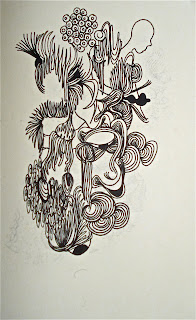
III.
I met Jesse the day I cut my hair. I went to a school of dark red brick walls that had a small square yard patched with black gravel. In case of rain there was a corner with a moldy wooden table that was protected by a tin roof. I was sitting at this table, eating a dry ham sandwich, when Jesse came over to flirt with me.
“It’s nice that you’re not afraid to eat alone.”
“I’m not sure if I would use the word ‘nice’.” I realized I must have come off as rather rude but he didn’t seem to mind.
“Do you mind if I sit with you?”
“No, no. Not at all.”
He took out something wrapped in tin foil from his backpack and pealed it back with slow care. It was a piece of neon green cake.
“That’s an interesting color for cake.”
“It’s real good. My sister made it. Do you want some?” He broke a fluffy green end off and propped it on my palm.
“So where’re you from anyway?” He took big bites as he spoke. I wondered if he had asked the question because of my accent or if he knew that I was the new foreign kid.
“Brasília.” His lack of a reaction made me realize he was too shy to say he didn’t know what or where Brasília was. “It’s the capital of Brazil.” Many of the people I went to school with had no concept of where I came from. Sometimes I wanted to make it up.
He smiled and laughed a bit. “More interesting than Wisconsin. I’m Jesse, by the way.” He reached out his hand to shake my own. I shook his hand, entirely baffled by the fact that a fourteen-year-old boy shook hands upon acquaintance like an old businessman would. It was only until later that I realized that shaking hands was the acceptable way of getting to know someone.
“Roberta.” I hated the way my name sounded in English. Those curly, aggressive ‘R’s’…
“Nice name.” Jesse took his last bite of cake just as I started to eat mine. I pictured those large soft chews of green growing in our stomachs.
Just then a group of cheering boys sounded from the opposite side of the black gravel square.
“Oh, right. I heard about this.” Jesse said while glancing over the scene.
“What? What is it?” Five girls from my freshman class had been summoned over by the boys. The girls were flushing and giggling while playing with their ankles and turning heads to see who was watching them.
“Each year the senior boys pick the five most attractive girls from the freshman class. Then they number them from least attractive to most attractive.”
“Ew.”
“Did you just say oh or ew?”
“Ew.”
Jesse laughed at me. “Well I don’t particularly agree with their selection anyway.”
I was about to say something about how they were almost all blonde and blue-eyed when a very short girl walked up to Jesse.
“This shit’s gross.” She crumpled her nose into her forehead and motioned towards the scene we had been watching. She then turned towards me and outstretched her arm in one, firm movement and gave me a tight handshake. I still hadn’t gotten used to the whole handshake thing and I was a bit embarrassed when I realized how limp my own handshake must have seemed.
“Dana.” She said. Her voice was deep and lulling.
“Roberta.”
She introduced herself in a casual manner that made it seem as if my presence were only too natural. Around Dana, I rarely felt like the new girl, except when Jesse cared to remind her.
“Roberta’s from Brazil.” Jesse said to Dana, excited about his newfound piece of information.
“Oh yeah? That’s cool.” Dana took a seat and propped her two elbows on the table, cupping her chin by her hands. Her movements were sharp and quick and so was her stare. “What’s it like there? So being in America must be pretty weird then, huh? Do you who know Britney Spears and P. Diddy are and shit?”
This was the sort of question that really irritated me. Did the Americans not know that their culture had basically infiltrated everyone else’s? Instead I just answered with a simple “Yeah, I do.”
By this point the five girls had been ranked into their proper places and the boys’ cheers had escalated into roars.
“Fuck Liz Danes. She’s stupid and not even pretty,” Dana snorted. I guessed Liz was the number one.
“You two were kind of friendly at one point,” Jesse said.
“No we weren’t. Anyway, I have to go. It was nice meeting you, Rob. I’ll see you after school Jesse.” She left as fast as she came and all I kept thinking about was how nobody had ever called me Rob before.
“That’s Dana for you. We’ve been best friends since kids and all,” Jesse explained.







